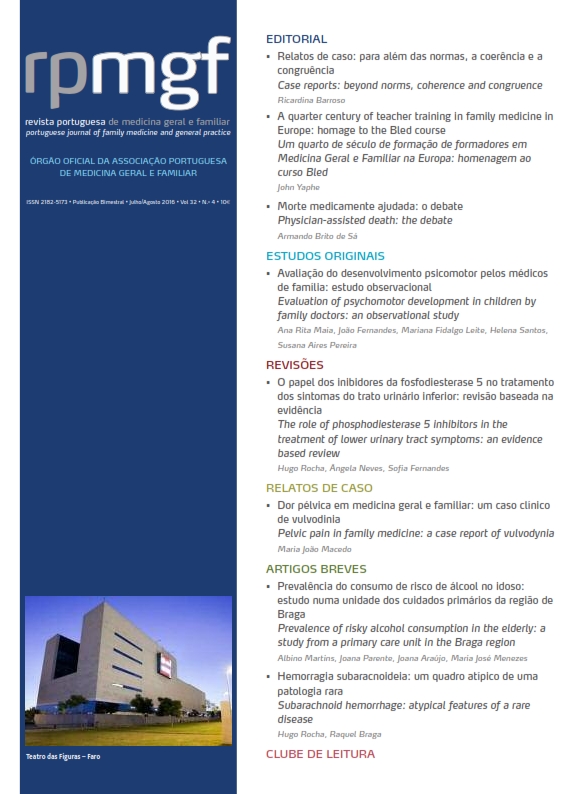Pelvic pain in family medicine: a case report of vulvodynia
DOI:
https://doi.org/10.32385/rpmgf.v32i4.11827Keywords:
Vulvodynia, Pelvic PainAbstract
Introduction: This case report describes a young woman who was diagnosed with vulvodynia at a family planning consultation. The primary care physician has all the suitable tools for proper diagnosis and therapeutic management of this prevalent and disabling condition. Case report: In September 2013, a 28 year-old nulliparous woman, without relevant medical or surgical history, attended a family planning consultation. When asked about symptoms she mentioned vulvar pain described as ‘stinging needles’, triggered by touch. Physical examination revealed vulvar redness and hyperesthesia when touched with a cotton swab. The diagnosis of generalized provoked vulvodynia was made, as there was a pelvic pain without a known cause. She was advised regarding vulvar hygiene, and treated sequentially with fluconazole for a presumed yeast infection, amitriptyline, and topical lidocaine. The patient was pain-free several months later. Review: Regardless of its etiology, vulvar pain can cause physical and psychological distress and interfere with interpersonal relationships. Vulvodynia is a complex and frustrating disorder for both patient and doctor, as it can be difficult to diagnose and treat. Family physicians play an important role in diagnosis, treatment, and referral of these patients. As vulvodynia has a considerable prevalence and is associated with psychosocial dysfunction, primary care providers should be informed about vulvodynia and pelvic pain so that these are issues are addressed and discussed with patients.Downloads
Downloads
Published
Issue
Section
License
The authors will assign to the RPMGF the sole right to publish and distribute the content of the manuscript specified in this declaration via physical, electronic, broadcasting or any other medium that may come into existence. They also grant the RPMGF the right to use and exploit this manuscript, in particular by assigning, selling or licensing its content. This permission is permanent and takes effect from the moment the manuscript is submitted, has the maximum duration allowed by applicable Portuguese or international law and is of worldwide scope. The authors further declare that this assignment is made free of charge. If the RPMGF informs the authors that it is not going to publish their manuscript, the exclusive assignment of rights ceases forthwith.
The authors authorise the RPMGF (or any entity it may appoint) to act on their behalf when it believes that copyright may have been infringed.





